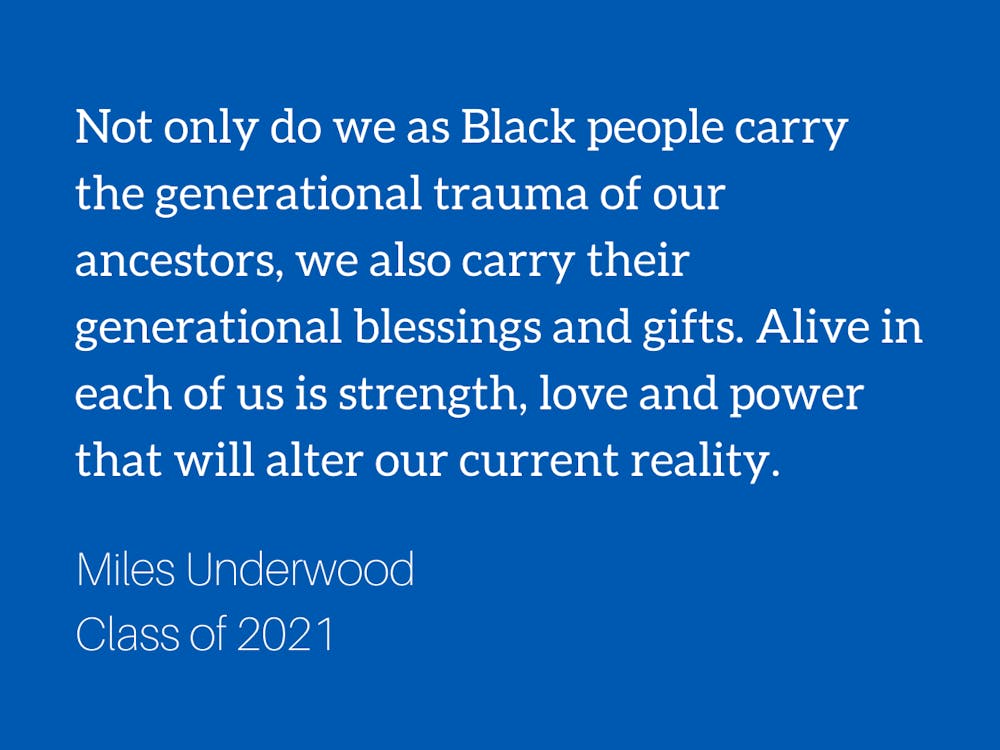Before I begin, I want to acknowledge the recent deaths of Ahmaud Arbery, Breonna Taylor, Sean Reed, Nina Pop, Tony McDade, and George Floyd. May these beautiful humans turned martyrs rest in peace, power and love.
I want to share with my Black Duke family two stories. When I scrolled through my instagram feed a couple weeks ago, I did not expect to stumble across the video of George Floyd’s slaying. After watching, I felt a deep wave of panic, fright and anxiety overtake me as I sat stunned staring at my phone. This brings me to my first story.
A few nights ago, I expressed my feelings to my mom, who shared something deeply profound yet disturbing. She said that generational trauma could explain my emotions. The hypothesis is that trauma experienced by our earliest ancestors in America was so intense that it became imprinted in their DNA and passed down generation after generation. Now in 2020, as we collect our own trauma from being Black, we still suffer from the same triggering memories of our ancestors.
To illustrate this, here is an example: I could be walking calmly down the street, smell something and quickly be sent into a fight or flight mode panic, all while not realizing that the trigger was the same scent of a magnolia tree that an ancestor watched their brother hung from.
As we discussed generational trauma, I said that if we can carry trauma in our DNA, then we must carry other of our ancestors’ experiences. My mom agreed: we also carry our ancestors’ strength, love and superhuman power. The strength it took to survive the Middle Passage, chattel slavery, sharecropping, Jim Crow segregation and the Civil Rights Movement is in our DNA.
The love and beauty it took to turn pain and suffering into internationally recognized literature, art and music that still resonates with us today is in our DNA. The superhuman power that has fueled rebellions against this system of oppression from the moment our ancestors were brought here is in our DNA. Not only do we as Black people carry the generational trauma of our ancestors, we also carry their generational blessings and gifts. Alive in each of us is strength, love and power that will alter our current reality.
My second story is about an APUSH lesson that has stuck with me to today.
While teaching about the origins of slavery and racism in America, my teacher explained that after the end of indentured servitude, America’s forefathers enslaved people from Africa as a labor base to build America. These forefathers soon faced a moral dilemma. As they fought for their own freedom from Great Britain, declaring that all men are created equal, they still owned and profited greatly from the enslaved African people. There they found their moral loophole, affirming that those darker-skinned people were not people at all, but instead, a subhuman species created for servitude, making it acceptable to enslave, to own and to work them to death for financial gain.
This ideology gave birth to the same racism that killed George Floyd over a $20 bill. For generations, Black folx have been reduced to subhuman beings to justify America’s economic exploitation.
Racism is rooted in economic injustice, created to keep us poor and unable to access the “American Dream”. In every industry, white America profits from cheap Black labor. This is the same cheap labor that worked tobacco fields and led to the creation of Duke University and the same cheap labor without which Duke would not function. Yet those Black custodians, cooks and staff are poorly compensated based on their value as Black people and not on the value that they create for Duke.
As Black students we must realize the responsibility that we carry. How will we use our Duke education to bring economic change to our communities? Will you use that Wall Street job to put Black dollars into Black portfolios and back into Black pockets? Will you use that job in Silicon Valley to teach Black kids how to code? Will you use that job on Capitol Hill to push for reparations legislation? In any career, we can significantly impact our communities. We did not choose to live the struggles of racism everyday, so we cannot only choose to combat those same struggles on some days. As we continue this fight for freedom, remember that we fight for our rightful stake in this country. We fight for that 40 acres and a mule plus 300 years of interest. We fight for what is owed.
Miles Underwood is a Trinity senior and the co-president of the Black Men’s Union.
Get The Chronicle straight to your inbox
Signup for our weekly newsletter. Cancel at any time.

